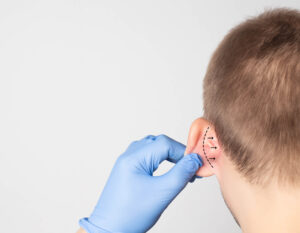 Are you concerned about the appearance of your ears? Have you considered ear surgery (also known as otoplasty)? If so, you may have questions about the procedure. Here, Dr. Jonathan Grant answers common questions patients ask about ear surgery.
Are you concerned about the appearance of your ears? Have you considered ear surgery (also known as otoplasty)? If so, you may have questions about the procedure. Here, Dr. Jonathan Grant answers common questions patients ask about ear surgery.
What can ear surgery correct?
Are you concerned about the appearance of your ears? Have you considered ear surgery (also known as otoplasty)? If so, you may have questions about the procedure. Here, Dr. Jonathan Grant answers common questions patients ask about ear surgery.
What can ear surgery correct?
Ear surgery is a procedure that can improve the appearance of your ears by addressing a variety of issues, including the following:
- Oversized or prominent ears
- Misshapen ears
- Underdeveloped ears
- Deformed ears
- Asymmetrical ears, such as ears that do not match in size or shape
- Ears that protrude too far from the head
- Injured ears
- Torn earlobes
- Earlobes that have stretched and increased in size
How do I prepare for ear surgery?
If you proceed with ear surgery to correct your ear issue, we will provide you with detailed instructions for surgery preparation. You will need to avoid smoking prior to surgery as well as discontinue the use of certain medications known to increase the surgical risks.
What can I expect on the day of surgery?
Your personal comfort is very important to us during your ear surgery. On the day of surgery, you should arrive early and well rested. The procedure typically takes one to two hours. You will need to have a friend or family member drive you home once surgery is complete. After surgery, you can expect mild discomfort, bruising and swelling.
What happens during the ear surgery procedure?
What happens during your ear surgery procedure will depend on your unique ear issues. Your ear surgery may include one of the following steps:
- For protruding ears, you may undergo “ear pinning,” a procedure that involves the placement of permanent sutures to hold the backs of the ears closer to the head.
- To reshape your ears, you may have cartilage bent or removed. In some cases, Dr. Grant may take cartilage from one part of the ear and graft it to another area.
- If you have stretched earlobes, a portion is usually cut out to make them smaller.
- Torn earlobes can typically be repaired with sutures.
What should I expect during recovery?
During recovery, your ears will be bandaged. As with all surgeries, you can expect some pain and swelling during your recovery. We will provide you with instructions on how to care for your ears during recovery. You may need to avoid sleeping on your side.
Most people need to take at least a week off work or school after their ear surgery. You will not be able to participate in sports or exercise for three to six weeks.
How can you find out if ear surgery is right for you?
Ear surgery can dramatically improve the appearance of your ears. If you have questions about ear surgery or would like more information about your procedure options, reach out to Dr. Grant and our knowledgeable staff. Give us a call or send us an email today.







